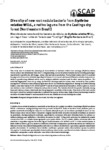Use este identificador para citar ou linkar para este item:
http://www.alice.cnptia.embrapa.br/alice/handle/doc/1049759| Título: | Diversity of new root nodule bacteria from Erythrina velutina Willd., a native legume from the Caatinga dry forest (Northeastern Brazil). |
| Autoria: | MENEZES, K. A. S.  NUNES, G. F. de O.   SAMPAIO, A. A.   SILVA, A. F. da   SOUZA, L. S. B. de   GAVA, C. A. T.   MARTINS, L. M. V.   FERNANDES JUNIOR, P. I.   |
| Afiliação: | KELLY ALEXSANDRA SOUZA MENEZES, UNIVERSIDADE DO ESTADO DA BAHIA GERSIKA FAKIRRA DE OLIVEIRA NUNES, UNIVERSIDADE DO ESTADO DA BAHIA ALINE ARAUJO SAMPAIO, UNIVERSIDADE DO ESTADO DA BAHIA ALEKSANDRO FERREIRA DA SILVA, UNIVERSIDADE FEDERAL RURAL DE PERNAMBUCO LAYANE SILVA BARBOSA DE SOUZA, UNIVERSIDADE DO ESTADO DA BAHIA CARLOS ALBERTO TUAO GAVA, CPATSA LINDETE MÍRIA VIEIRA MARTINS, UNIVERSIDADE DO ESTADO DA BAHIA PAULO IVAN FERNANDES JUNIOR, CPATSA. |
| Ano de publicação: | 2016 |
| Referência: | Revista de Ciências Agrárias, v. 39, n. 2, p. 222-233, 2016. |
| Conteúdo: | This study aims to evaluate the phenotypical characteristics of bacterial isolates from mulungu (Erythrina velutina Willd.) nodules and determinate their Box-PCR fingerprinting. All bacteria were evaluated by the following phenotypic characteristics: growth rate, pH change, colony color and mucus production. The bacterial isolates able to re-nodulate the original host were also evaluated regarding its tolerance to increased salinity and different incubation temperatures, ability to growth using different carbon sources, intrinsic antibiotic resistance and ?in vitro? auxin biosynthesis. The molecular fingerprints were set up using the Box-PCR technique and the isolates were clustered by their profiles. Among the 22 bacterial isolates obtained, eight were able to re-nodulate the original host. Among the nodule inducing isolates, some were tolerant to 1% of NaCl and 39° C and all of them metabolized the maltose, fructose, glucose, sucrose and arabinose, were resistant to rifampicin and produced auxin. The bacteria showed low genetic similarity among them and reference strains, which indicates the great genetic variability of the isolates. The results of this work are the first reports about the bacterial isolates able to nodulate this species. A more deep study of these bacteria may reveal the existence of isolates tolerant to environmental stresses and suitable as a future mulungu inoculant. |
| Thesagro: | Caatinga Mulungu Inoculante |
| NAL Thesaurus: | Erythrina velutina |
| Palavras-chave: | Bactérias isoladas de nódulos Box-PCR Fixação biológica de azoto Leguminosa arbórea Planta nativa Rizóbio Biological nitrogen fixation Tree legumes Inoculant Rhizobia |
| Digital Object Identifier: | 10.19084/RCA15050 |
| Tipo do material: | Artigo de periódico |
| Acesso: | openAccess |
| Aparece nas coleções: | Artigo em periódico indexado (CPATSA)  |
Arquivos associados a este item:
| Arquivo | Descrição | Tamanho | Formato | |
|---|---|---|---|---|
| PauloIvan1.pdf | 764,18 kB | Adobe PDF |  Visualizar/Abrir |









